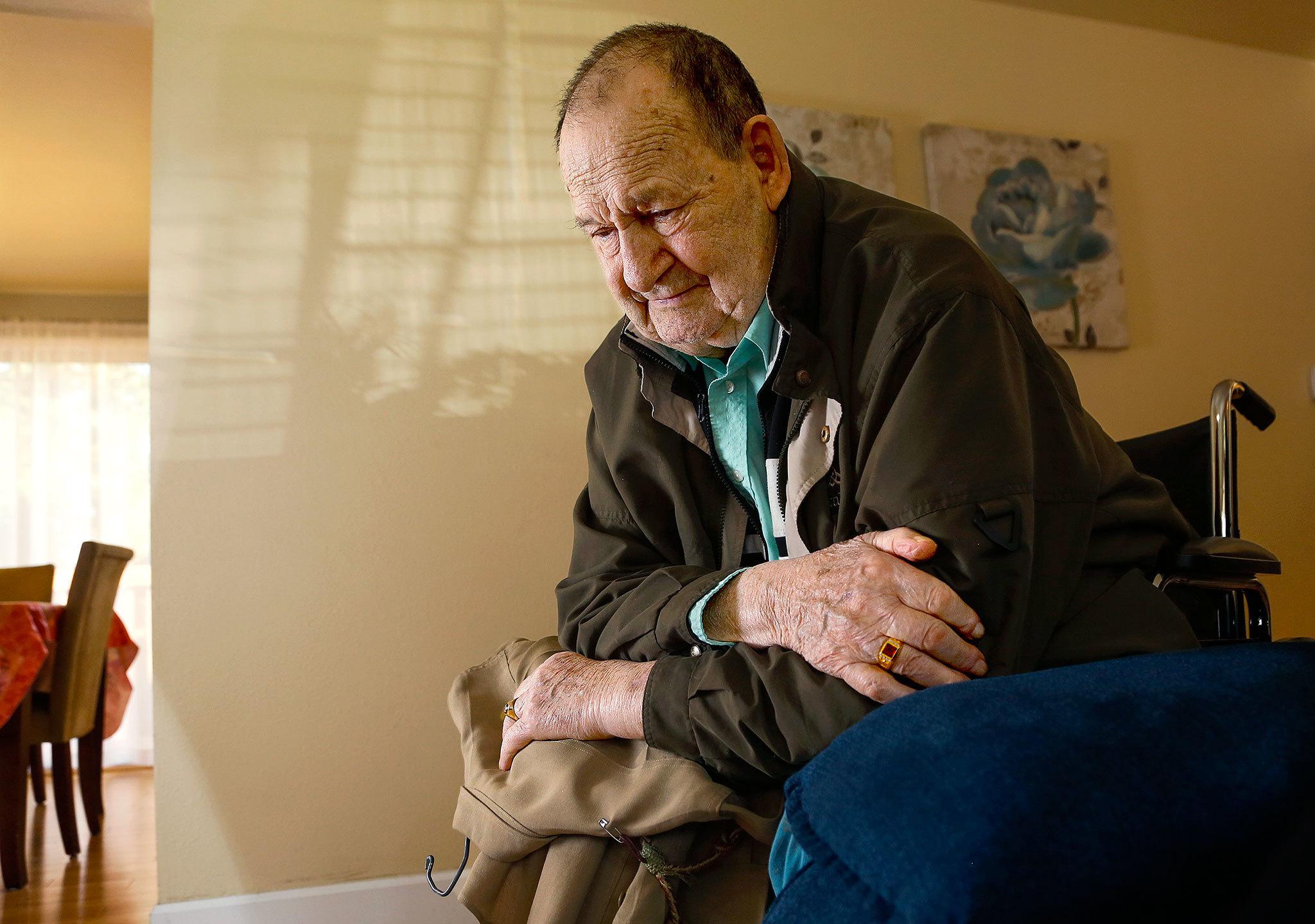Related: Stanwood veteran opens up about the horrors of World War II
His thoughts of war come at night. Before he can sleep, Paul Bartlett writes them down.
By day, the 89-year-old Bothell man is spare with details he shares of the Battle of Iwo Jima. Yet Bartlett, a retired teacher, revealed the horrors of battle in a tribute poem he wrote one recent night.
“Experiencing a terror in no man’s land/wondering where the next shell will land,” he wrote in a poem titled “Iwo Jima — A Remembrance, Lest We Forget.”
The poem opens with grim images of dying comrades taking their last breaths.
It was 1945, the last year of World War II, when nearly 7,000 U.S. Marines were killed and another 20,000 wounded in the fierce fight to capture Iwo Jima from Japan. Of about 21,000 Japanese soldiers dug in to defend the Pacific island when the battle started on Feb. 19, 1945, only 216 were taken prisoner before it ended 35 days later. The rest, some 20,700 Japanese, died on Iwo Jima.
Bartlett was a teenage machine gunner in the 9th Marine Regiment, part of the Marine Corps’ Third Marine Division. He enlisted in 1944 and was serving on Guam when his division embarked as part of the landing force on Iwo Jima. After the war ended, he was transferred to the First Marine Division in China before coming home in 1946.
“I’m an old veteran,” he said. “In the Battle for Iwo Jima, I was only a 17-year-old kid. I must have had a baby face — fighting for my life.”
Bartlett grew up poor in North Dakota. His mother was separated from his father. He and several siblings spent their earliest years in a Catholic orphanage. When he was 17, his mother went with him to the town of Cavalier, North Dakota, to sign the papers that let him join the Marines.
“I wanted to get somewhere that I didn’t have to work as a laborer. In those little towns, that’s all there was,” Bartlett said. He rode a train to boot camp in San Diego. Within months, he shipped out to join the war effort in the Pacific.
Back in North Dakota after the war, he was helped by the GI Bill to attend Mayville State Teachers College. There, he met his future wife, Berva. They were married in 1951, while Paul Bartlett was in Marine Corps officers training in Quantico, Virginia. He became a first lieutenant in a communications platoon and served in South America. Eventually, he chose a civilian career in teaching.
His wife had family in British Columbia, so they settled in Everett. Berva Bartlett taught English at Everett High School for 30 years. He taught in Lake Stevens for 26 years, at Hillcrest and Mount Pilchuck elementary schools. Bartlett had also taught high school and was a coach in Minnesota.
Once college sweethearts, the Bartletts now live in an assisted living home in Bothell. He suffered a stroke and uses a wheelchair. His wife struggles with memory issues. They have two grown children. Jeff Bartlett works for the Boeing Co., and Lynn Bartlett Johnson is a concert violinist.
Bartlett, who still has his Marine Corps uniform, doesn’t dwell on the war. “I have a million stories, but I’m not going to tell them,” he said.
There are the searing memories that surfaced in his poem, and a few details he does share. He recalled coming ashore on Iwo Jima in a Higgins boat, a small landing craft. “The reason they wanted that island, it had three airstrips. We had B-29s flying from Guam, and with those airstrips they wouldn’t have to ditch in the ocean. They would have a place to land,” he said.
He ate field rations and slept in a foxhole on Iwo Jima. “Hopefully we’d still be there the next morning,” he said. He awoke once to find his foxhole surrounded by bodies of Japanese soldiers killed in the night by fellow Marines. “You became immune to all the noise,” he said.
Bartlett saw the enemy fighters as good shots with one goal. “They weren’t there to wound us, they were there to kill us,” he said. Out on patrol, he once found a rifle that had a booby trap — explosives jammed in the barrel. “If I had fired it, it would have blown my head off,” Bartlett said.
He’ll never forget a skilled gunnery sergeant who was given a battlefield commission. “They made him a first lieutenant. He was killed the next day,” Bartlett said. “That was the way it was on that island.”
There were 41 men in his unit. Bartlett said he was one of only three not killed or wounded on Iwo Jima.
One good memory is the voyage home. Aboard the USS Randall, an attack transport ship, Bartlett and other Marines were treated to steak dinners and ice cream. They played basketball on deck.
“I do a lot of thinking about it now. When I wrote that tribute, I thought about the veterans and all the things that happened,” he said.
“I have to write them down, or I can’t sleep. War is a horrible thing.”
Julie Muhlstein: 425-339-3460; jmuhlstein@heraldnet.com.
“Iwo Jima — A Remembrance, Lest We Forget”
With gun in hand
while passing dead comrades
onward to step into more death
seeing those taking their last breath —
Experiencing a terror in no man’s land
wondering where the next shell will land —
With stomach tied in a sickly knot
bullets flying and trying to not get shot —
Looking for the hated foe
shoot them first because you know —
when they’re gone the battle will end
then we can all look round the bend
to peace with its normal sight
forget this hell and set things right.
— by Paul Bartlett
Talk to us
> Give us your news tips.
> Send us a letter to the editor.
> More Herald contact information.



























